Copyright 2006 by Rick Barrett. All rights reserved. No portion of this book, except for brief review, may be reproduced, stored in a retrieval system, or transmitted in any form or by any meanselectronic, mechanical, photocopying, recording, or otherwisewithout written permission of the publisher. For information contact Blue Snake Books c/o North Atlantic Books.
All photographs are by Stephen Barrett, except photo 4 (by Hadley Manings) and photo 5 (by Rick Barrett). All drawings are by Micaela Barrett.
Excerpts from The Secret of the Golden Flower by Thomas Cleary reprinted by permission of HarperCollins Publishers.
Published by Blue Snake Books
| Blue Snake Books publications are | Cover design by Brad Greene |
| distributed by North Atlantic Books |
| P.O. Box 12327 |
| Berkeley, California 94712 |
Taijiquan: Through the Western Gate is sponsored by the Society for the Study of Native Arts and Sciences, a nonprofit educational corporation whose goals are to develop an educational and cross-cultural perspective linking various scientific, social, and artistic fields; to nurture a holistic view of arts, sciences, humanities, and healing; and to publish and distribute literature on the relationship of mind, body, and nature
North Atlantic Books publications are available through most bookstores. For further information, call 800-733-3000 or visit our websites at www.northatlanticbooks.com or www.bluesnakebooks.com.
PLEASE NOTE: The creators and publishers of this book disclaim any liabilities for loss in connection with following any of the practices, exercises, and advice contained herein. To reduce the chance of injury or any other harm, the reader should consult a professional before undertaking this or any other martial arts, movement, meditative arts, health, or exercise program. The instructions and advice printed in this book are not in any way intended as a substitute for medical, mental, or emotional counseling with a licensed physician or healthcare provider.
Library of Congress Cataloging-in-Publication Data
Barrett, Rick, 1951
Taijiquan : through the western gate / by Rick Barrett.
p. cm.
eISBN: 978-1-58394-389-2
1. Tai chiPhilosophy. 2. Mind and body. I. Title.
GV504.B37 2006
613.7148dc22
2005034325
v3.1
This book is dedicated to
 Dick and Phyllis,
Dick and Phyllis,
who taught me early on to look
behind the curtain.
The real voyage of discovery consists not in seeking
new landscapes but in having new eyes.
Marcel Proust, Remembrance of Things Past
Contents
.
.
Acknowledgments
I would like to thank all of my many teachers. Three who have had a particular impact on this book merit special mention: Grandmaster William C. C. Chen, master innovator and consummate pragmatist, has been my guide for more than a quarter of a century and epitomizes the Way in his every move. Master Yang Fukui has shown me the power, beauty, and wisdom of the traditional with an excruciating generosity. John Beaulieu, my polarity teacher, has shown me the web that connects energy medicine, martial arts, science, and philosophy.
Undying gratitude and love to Nina Hopkins Sugawara, energy doctor and master teacher, whose fingerprints are all over this book. She has been an inspiration from the start and has contributed to every phase. Nina has read every word of every iteration with the zeal of a prophet and provided insights of both substance and style. It would not have been done without her.
Philosopher Jonathan Shear, who has been deconstructing the Western Gate for several decades, has checked my sums and kept me real.
Thanks to all those who have read various incarnations of this work and helped me shape it into its current form. You have all made me a better writer: Ritu Kalra, Stephe Watson, Mark Dobson, Susan Jordan, Pat Deluz, Arthur Aronson, Jane Jiambalvo, and Jesus Lopez.
To Jeff de la Concepcion, Stephe Watson, and Ric Meyers for demonstrations.
My love and gratitude to Maria, Brian, Devon, and Micaela for their unconditional love, inspiration, and faith. It is not easy having a gorilla of insubstantiality roaming about. Thanks for your patience and understanding.
Many thanks to Julie Brand, Sue Heinemann, and Brad Greene for showing me how to turn a manuscript into a book.
A Note on Transliteration
and Romanization
Many errors, of a truth, consist merely in the application of the wrong names of things.
Baruch Spinoza, seventeenth-century Dutch philosopher
I do not speak or write Chinese and can be only dimly aware of the challenges facing translators of taijiquan texts. I imagine rendering the pictorial symbols of Chinese into English is akin to translating poetry into algebra. Each pictogram tells a story, and the knowledgeable can spend hours explaining the nuances of a single word. Information is inevitably lost on the journey into English.
I am deeply indebted to many sources for their efforts in bringing the subtleties of the taijiquan literature to light. The translators who have influenced this writing most are Thomas Cleary, Louis Swaim, Douglas Wile, and Yang Jwing-Ming, but many other voices are heard as well. Each has his own take on the essential texts, colored by his training and practice, and it was sometimes difficult to choose which interpretation fit best for a given passage. Generally, I consider the ambiguity of the poetic passages to be an asset, demanding that students open themselves to direct experience of the subject matter. The various choices present opportunities to view the subject from different perspectives, ultimately to the careful readers advantage.
Romanization is the rendering of a language into the Roman, or Latin, alphabet. Pinyin became the official version recognized by the Peoples Republic of China in 1953, replacing the older Wade-Giles system. Some earlier English transliteration used a truncated version of Wade-Giles, as in tai chi for tai-chi chan, here deleting aspiration marks, the umlaut in the third syllable, and the hyphen denoting a compound word. The pinyin taijiquan is less familiar to the Western eye, but it is considerably more economical than the Wade-Giles version and more accurate than the abbreviated one.
It was with some hesitation that I surrendered the small comfort of a few broadly recognizable Chinese terms in favor of the consistency and accuracy of pinyin. Instead of adopting the popular spelling Tao, for instance, I have used the pinyin Dao, which is closer to the actual sound of the word. My intention is not to challenge readers; rather, it is a recognition that pinyin promises to be around for a long time and is already replacing the older system. I depart from pinyin in the spelling of names of individuals already well known in the West, such as Confucius (Kong-tse) and Cheng Man-Ching (Zhang Man-qing). Chinese surnames are listed first, as in Wang Zong-Yue.


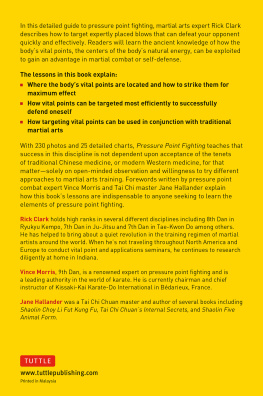
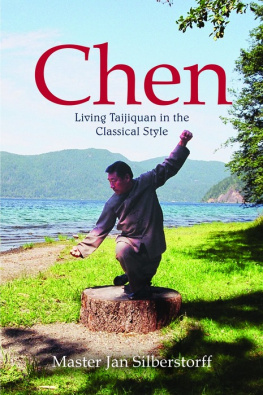
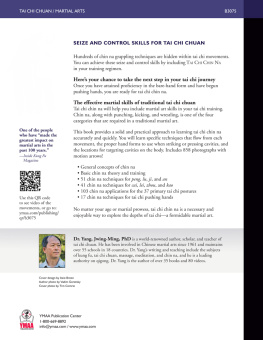
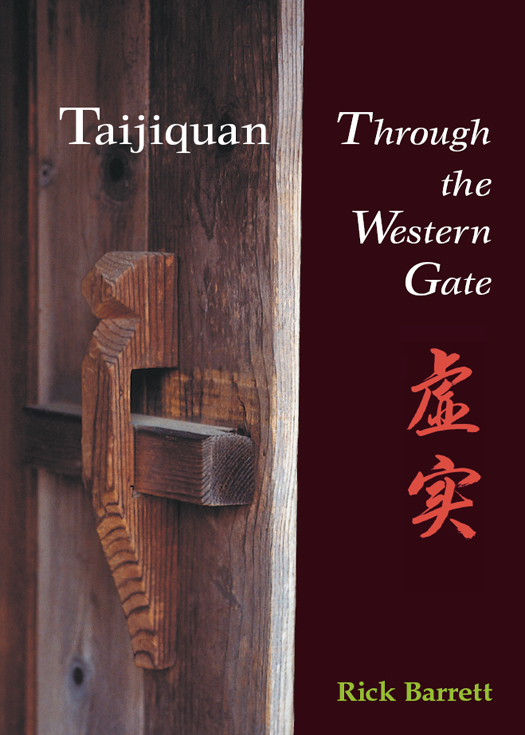
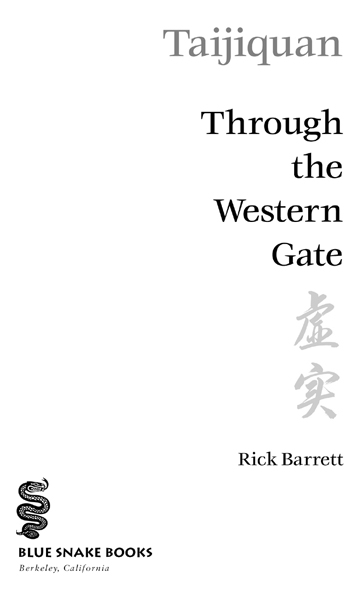
 Dick and Phyllis,
Dick and Phyllis,